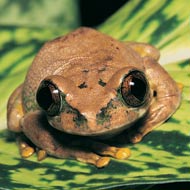
Frogs caught outside permitted hunting areas
Police in Turkey have released some 7,500 frogs back into the wild that were destined for export.
According to the state-run Anadolu news agency, the amphibians were found in dozens of nets when police stopped a minibus during a routine vehicle stop. The officers were in the heart of the tourist region of Cappadocia when the event took place.
Five men were arrested for trafficking the frogs, who told police they caught the frogs in the Kizilirmak river basin. They said they were transporting the frogs to the southern province of Adana, where they intended to sell them on to an exporter.
Hasan Huseyin, head of the district livestock agency, oversaw the release of the frogs back into the Kizilirmak. He said that he had never encountered such a large-scale poaching before.
“We just released the frogs back to nature because they were caught without permission and outside permitted hunting areas,” he told Anadolu Agency.
Frog hunting is big business in Turkey; poachers usually sell their catches to France and China, where they are considered a delicacy.
To hunt frogs, a person must hold a hunting licence. However, it is only permitted in certain seasons and some frogs should not be collected at all because they are endangered.



 RCVS Knowledge has welcomed Professor Peter Cockcroft as editor-in-chief for Veterinary Evidence.
RCVS Knowledge has welcomed Professor Peter Cockcroft as editor-in-chief for Veterinary Evidence.